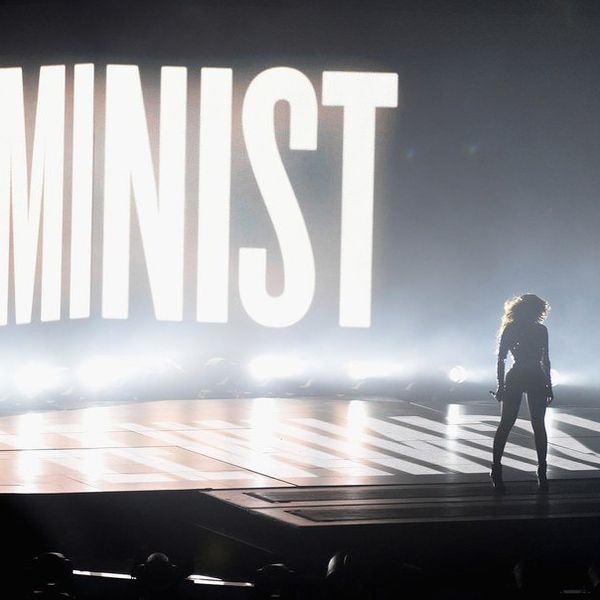Midterms might be over, but here is a quick quiz. Don't worry if you didn't study; there are no wrong answers.
Question One: Is it your personal belief that women should be provided equal rights and opportunities as men?
A. Yes
B. No
Quiz Results: If you answered "A," then you are a feminist. If you answered "B," then you are not.
Now, I said there are no wrong answers because the question asked about what you believe. If you answered truthfully about what your actual belief is, then you cannot possibly have been wrong. However, you might disagree with the results. If you answered "A," yet claim that you are not a feminist, then you are wrong by definition.
This article is not to convince those who answered "B" to change their minds. If you don't believe that by now, the words of a 21-year-old senior won't change that, and frankly, I have no desire to waste my time. This is for the people out there who answered "A," but claim they can't get behind feminism because of what they believe feminism stands for. I would like to make one fact extremely clear: there is a big difference between feminism and feminists. Feminism is a movement and a belief that stands for women's equal rights. Feminists are individuals who believe in feminism, but do not represent the movement of feminism as a whole.
Every college student's best friend, Google, provided me with this definition of feminism: "The advocacy of women's rights on the ground of political, social and economic equality to men."
If you are looking for what being a feminist includes, it's there in the definition of feminism. Being a feminist entails that you support equal rights and opportunities for women. This past week, I stumbled across an article written by a fellow Odyssey author, entitled "I Am Not A Feminist, And That Is Okay." This article revealed to me just how misinformed many of my peers are on what feminism actually means.
The author begins by asserting that she does, in fact, understand what feminism is talking about and that she knows what is being said, she just doesn't agree. However, later on in the article, she mentions that it is "okay" to like/want the following things: cooking, taking care of your husband and children, your boyfriend asking your father's blessing before proposing to you and taking your husband's last name. She then states: "Feminists wouldn't have you believe these things."
This is where the author is wrong and contradicts her earlier statement. Perhaps certain feminists would adopt the mentality that a woman shouldn't like or want any of those things, but an overwhelming majority of feminists, especially college-aged feminists, are extremely accepting of that point-of-view. As a college-aged feminist, I do not think it is my place to tell another woman what kind of lifestyle would make her the happiest. If you want to never get married and run your own business, do it. If you want to stay home and take care of your husband/wife and children, do it. If you want to be a college professor and come home to your spouse and kids and cook dinner, do it.
Feminism doesn't mean that you don't have the option to want what the author refers to as "traditionalist values." Feminism means that now, women also have the option to not want that kind of life, and they are provided equal rights and opportunities as men to live the kind of life they truly want. This is an option that frankly wasn't available to women until the feminist movement began. Simply because certain feminists assert one belief, that does not mean they speak on the behalf of feminism. If you believe women should have that option, you are a feminist.
Later in the article, the author adjudicates that while women are not lower than men, she believes the man is the head of the household, which brings with it a lot of pressure, and that she does not "understand why feminists want to take it on." Let me begin by saying that a feminist can most certainly want her spouse (as we should not be limiting this discussion to only heterosexual relationships) to be the head of the household.
Again, as a feminist, I am in no place to tell another woman what kind of life to lead. But why is it so absurd to believe that a woman is rationally capable of wanting equal or more responsibility than that of a man? I do not judge you for wanting less responsibility, so why are my beliefs being called into question when I say I don't want my husband to be the head of my household? I want to share equal responsibility, and that should be just as easily accepted as someone wanting more or less responsibility as well. The author mentions how women were made to be "fragile beings," but we are also "strong beings" and "capable beings." Well, yes. I am strong. I am capable. And sometimes, I am fragile. But that is not because I am a woman. That is because I am a human.
Being a feminist isn't simply fighting for equal pay. People tend to forget that female genital mutilation still happens across the world and that women are still viewed merely as property of their husbands. Being a feminist isn't burning bras and taking our last name to our grave. But, it is saying that women should be given the opportunity to do so. Being a feminist isn't adhering to what other feminists say a woman should be. It's about being the woman you want to be and believing that you deserve the right to pursue that version of you, as does every other woman. That version of you is special. That version of you is unique. And that version of you is second to no one, woman or man.





















